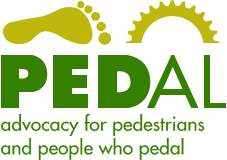It was 8:45 pm Sunday and we were out of milk, bananas, and cinnamon raisin bread. Foxy was riding shotgun, nose out the window, her spirit high on the clean, cool, salt air bombarding her eyes as we made our way up Calle Puente toward Palizada and the new Ralphs. There were cars on the road.
There was also a bike. My headlights caught the pedal reflectors. Nothing else was visible. Cars approaching the intersection illuminated a small, 12-inch-wheel child’s bike ridden by a darkly-clothed little boy pumping up Calle Puente to Palizada.
Just a few feet from the corner, a truck was parked adjacent the curb on the northbound side of Puente. The kid was skimming its side as he approached the corner. He was on the wrong side of the roadway, riding against on-coming motor vehicle traffic. There is no sidewalk on that side. There is no bike lane, either.
A car on Palizada approached the intersection. Its right turn onto Calle Puente would be a blind turn because of the parked truck. I madly flashed my lights at on-coming vehicles. I anticipated the worst.
The car on Palizada went straight through. I doubt my mad flashing changed its course. Fortune–or a guardian angel–was on the kid’s side. But danger still rode with him. More cars came downhill from Ave. Miramar. Momentarily, cross traffic was clear. The kid dismounted, then dashed to the sidewalk across Palizada.
I tracked him. I put my flashers on. A driver behind me was impatient. He chose to pass me as I matched the kid’s speed on the sidewalk. In the driveway gaps between the parallel-parked cars, I talked to the kid as he diligently pedaled up the hill toward home.
“Did you know that’s really dangerous?” I began. He stopped.
“What’s dangerous?” He asked.
“Your riding without a headlight and you’re on the wrong side of the road,” I replied.
He started riding again. Another car behind me zipped around my tail and between the kid and me.
“My Dad’s following me,” he advised as he struggled to control his bike over the steep driveway flares. The obstacles caused him to stop again. His Dad was way ahead.
“Your Dad couldn’t save you from the cars. They won’t see you because you’re invisible,” I calmly warned. “They won’t see you until after they hit you. You could get hurt there. You don’t have a light. You don’t have a helmet,” I stated without the emotion that my pounding heart was betraying. He stopped in a driveway to listen.
“Look–I’m not trying to get you into trouble. I’m just trying to help you be safe. You can’t ride that way. You’ll get hurt really bad. I’m worried about you,” I pleaded.
“I have to get home,” he told me. He started riding again. I let him go on without interruption. He had no more streets to cross, just driveways. A latino man walked in the roadway, approaching his son.
“Is that your son?” I asked. “Yeah,” he responded without saying much else.
“I’m worried he’s going to get hit by a car,” I pleaded. He looked at me like he thought I was strange. Maybe he was just confused. Maybe he thought I was some creepy person. I thought there might be a language barrier issue.
“Do you speak English?” I asked, going out of my way to avoid sounding authoritarian in any way. “Yes, I do.” He replied with only a slight accent. I was ready to speak in Spanish if I had to, even though my native English has buried the Spanish skills I once worked so hard to develop. The conversation continued in English.
I explained what I had said to his son and why I was making the effort. “I’m afraid your son will die in the road,” I pleaded.
“I’ll get him a helmet,” he responded.
“He needs lights for his bicycle when he rides at night and he’s riding on the wrong side of the roadway. Cars won’t be able to see him and the helmet might not save him,” I explained. “Did you know that he should be riding on my side of the roadway, with the traffic?” I asked without an accusatory tone.
“No,” he said. The look on his face was guardedly curious, maybe on the verge of taking exception to my interference with his parenting or at least with his son’s progress home, especially on a school night.
“But I was following him home,” he stated, repeating exactly what his son told me.
“You can’t save your son from the cars that don’t know he’s in the street,” I observed. “I teach kids how to be safe on their bikes and I’m just trying to point out that your son will be safer if he used lights and a helmet and he rode on the correct side of the roadway,” I pleaded again.
“Thank you,” he said. “I’ll get him a helmet.”
But I wonder if I’d made the right choice. He’s not my kid. I wonder if the message struck home. I wonder if they think I’m nuts.
I can live with the latter. I can’t live with consequences of a missed moment to teach a kid to be safe. None of us should.
So, grown-ups: educate yourself. Educate your kids. Enable them to protect themselves.
Even if it’s not your kid.
